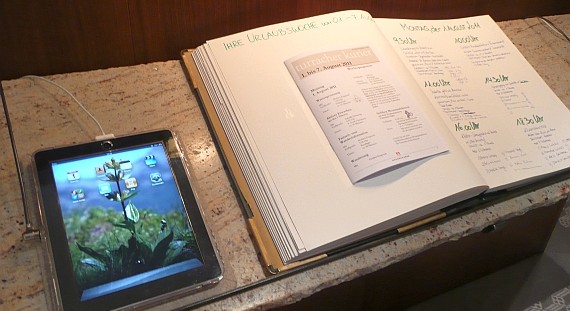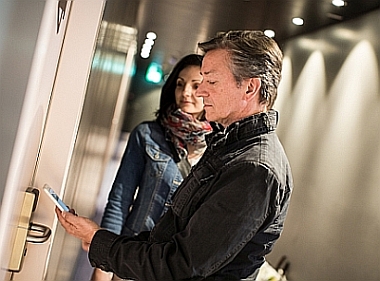
News & Stories
Wiesbaden. The cryptocurrency Bitcoin tends to polarise views. Whilst some see a very volatile currency which, according to media reports, is primarily used by criminals, others still believe in Bitcoin's big future as an excellent alternative to the currencies used by the global banking system. Opinions in the hospitality sector are divided. Some of its pioneers already accept the internet currency.
Zell am See. Three countries, 667 hoteliers, one finding: The digital waves have embraced the hotel operations quicker than the management. And the gap between knowledge and action is enormous. This can be interpreted from the comprehensive study by Roland Berger whose basis is provided by a total of 667 hotels in Germany, Austria and Switzerland. It was presented during the annual convention of the Austrian Hotelier Association in Zell am See this week. In addition to this, the industry representatives also discussed an OTA charge with the Austrian cartel authorities.
Bern. The new second homes law in Switzerland will come into force on January 1, 2016. Thereafter, the owners of their own hotels, which they relinquish for economic reasons, may only convert up to 50 percent of the primary usable area into second homes. Many questions are still open.
Berlin. From start-up to market leader! Many dream of this, but the young man behind Dreamlines has managed it. The good old Postbus is also making more journeys - but with new ideas in the suitcase. And even Deutsche Bahn has meanwhile set up its own "innovation lab" with the aim of attracting future customers in a much more personal way. What can the hotel industry learn from these young and old companies? Quite a lot - insofar as they're ready to question their own actions and focus on the customer/guest rather than themselves. Three examples of other companies' ideas.
Wiesbaden. Into the room via Smartphone: What still sounded like a complete utopia a few years has come true in the meantime. An increasing number of guests are not only booking their hotel room through an App but with its help, are also going directly to their room without a stopover at reception. A bit of magic that certain target groups no longer want to do without today. Which technology is able to do what? prizeotel, B&B, Lindner Hotels and the Schani Vienna private hotel report, AccorHotels is disappointing expectations.
Brussels. "It's tragic, we all feel it, the team is deeply affected." On Wednesday, Wolfgang M. Neumann returned from Bamako, Mali, where terrorists stormed the Radisson Blu last Friday and took hostages. In the end, 22 people lost their lives, including three employees and two armed security guards. "The most important thing after the attacks was to be present and to be there for employees, guests and the families," the CEO says. This is the second time in the history of Carlson Rezidor Hotel Group that it has experienced a terror attack. Employees in Brussels this week also suffered as the terror alarm was raised to the highest level, just like their colleagues in Paris in the week before.
Brussels. The threat is everywhere. Take action before your hotel is hit. Pay attention to signals. Check the weak links in your chain of security. Security has become part of hotel DNA today, just like food & beverage, housekeeping, revenue management, or the restaurant. Most hotels have managers for these departments, but no Head of Security. The man talking about the most serious topic of these weeks – in light of the terror attacks in Paris and Bamako – is Didier Ranchon, a pioneer in the institutional security business. Based in Brussels, Didier Ranchon previously created and managed the EU representation for a leading French and EU risk management company. He has worked in different operational units covering drugs/narcotics, organized crime and international criminal networks. He is a recognized expert in the World Tourism Organization and keynote speaker in many university symposiums addressing security, risk assessment and crisis management themes.
Düren. When German holidaymakers choose a holiday apartment or a holiday home for their summer holiday, they prefer to stay in their own country. Croatia is behind Italy, but is nevertheless in the overtaking lane and in winter, Austria has its nose entirely in front.
Munich. No question drives owners of hotel property more than which operator can best increase the value of their property. Four entirely different concepts had positioned themselves as the best strategy during Expo Real in Munich in October – of Budget, Full Service, Luxury and Lifestyle. The CEOs from the lateral-thinking budget brand, Yotel, from the British Midscale chain, Premier Inn and the luxury hotel group, Kempinski, discussed the topic, "Luxury, Budget, Service, IT: How do operators increase the property value?" – expanded upon and scrutinized by the internationally operating investment and asset management company, Cedar Capital.
Rome. The sun was bright in the Italian summer of 2015. Yet, some clouds remain on the horizon, especially concerning employment issues: a clear signal that the industry’s recovery has started but still needs some help in order to stabilise itself and gain the necessary consistency. This is the scenario of the Italian tourism sector drawn from data collected by industry associations, research institutes and the National Statistic Agency.








